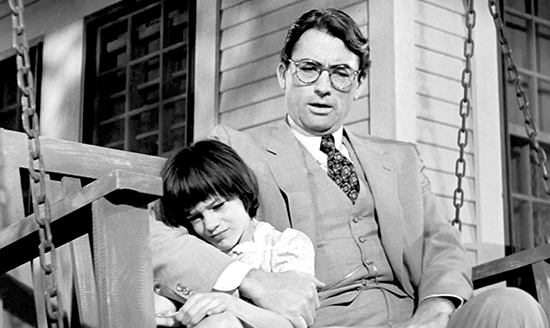Classic Hollywood: Films of ’62: To Kill A Mockingbird

As a writer, I’ve always marveled at people who adapt books for the screen. On the upside, the scriptwriter gets the benefits of an established story, characters and dialogue. But there are plenty of downsides: How can you turn a beloved novel into a film that fans of the original will accept, along with the moviegoers who simply want to be entertained? How do you capture the magic of the printed page on celluloid? Which parts do you cut and which do you keep?
It had to have been a daunting task for Horton Foote to adapt Harper Lee’s Pulitzer Prize-winning best seller into a critical and box-office success. Yet Foote’s masterful blueprint won an Academy Award, and was matched by the film’s flawless casting, from Gregory Peck’s Oscar-winning role as lawyer Atticus Finch, to Mary Badham’s portrayal of Finch’s daughter Scout. (Sidebar: Can you imagine Rock Hudson as Atticus? Apparently, he lobbied for the part. I can’t even.)
Badham was an unknown nine-year-old when she and her mother answered a “cattle call” audition in Birmingham, Alabama. Her natural performance earned an Oscar nomination as Best Supporting Actress (she lost to fellow child star Patty Duke for The Miracle Worker). Badham mostly retired from acting to raise a family, though her brother John became a successful director, helming hits like Saturday Night Fever and War Games.
The father-child bond Peck and Badham created on screen was genuine; they kept in touch throughout their lives. In the book, Scout, Atticus & Boo by Mary McDonagh Murphy, Badham recalled: “Gregory Peck will always be Atticus. He was so wonderful. I miss him a lot. Years later, the phone would ring, and he’d be on the other end of the line. ‘What ya doing, kiddo?’ If he was gonna be on the east coast, he’d say, ‘I’ll take you out to lunch.’ And whenever I was in California, I’d always go visit. He was such a role model, and I always wanted him to be proud of me.”
Harper Lee and Peck also shared a special connection. Atticus was modeled after Lee’s father, Alabama attorney A.C. Lee, whom Peck met during the shoot. Lee died eight months before Mockingbird premiered, but Harper gifted Peck with A.C.’s watch, which the actor carried in his tux pocket the night he won the Oscar. Co-star Brock Peters, who played Atticus’ client Tom Robinson, was such a close friend, he delivered the eulogy at Peck’s funeral in 2003.
Having loved the book and movie, I was eager to see Aaron Sorkin’s version of Mockingbird on Broadway. Could Jeff Daniels escape Peck’s indelible shadow? Not entirely, but I loved Celia Keenan-Bolger’s Tony-winning turn as Scout. Currently, Richard Thomas headlines the play’s 25-city national tour, and how’s this for a cool fact? Mary Badham has a supporting part as the nasty, morphine-addicted neighbor Mrs. Dubose!
Next time you see To Kill a Mockingbird, here are two things worth noting: Robert Duvall, who made his motion picture debut as Boo Radley, never speaks a word of dialogue; and pay attention when Mayella Ewell (Tom Robinson’s accuser) is sworn in during the trial. Mayella’s hand hovers over the Bible, but doesn’t touch it, when she swears to tell the truth – because she knows she won’t.
Classic Hollywood posts appear bimonthly on The Music Hall blog.
